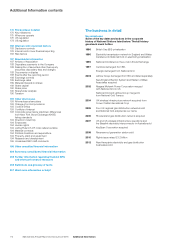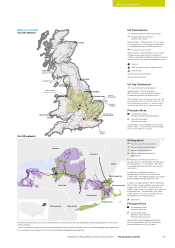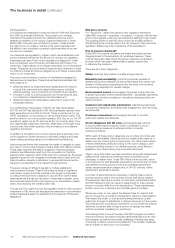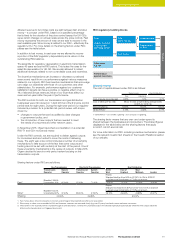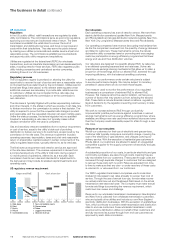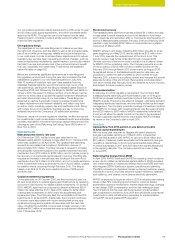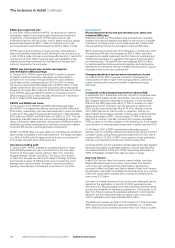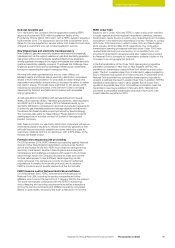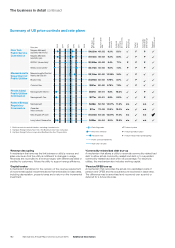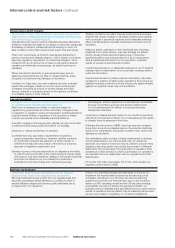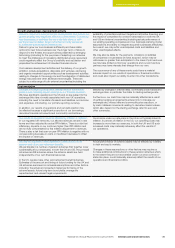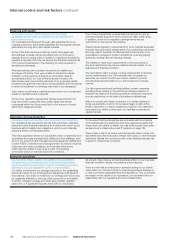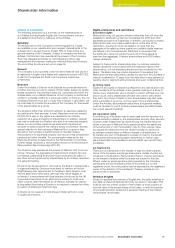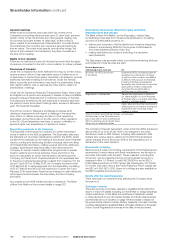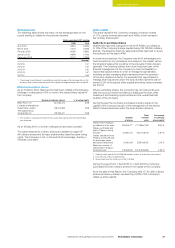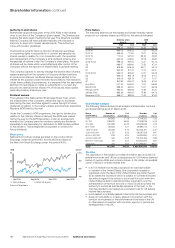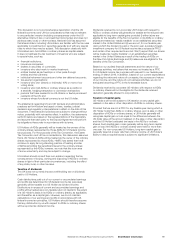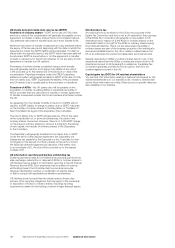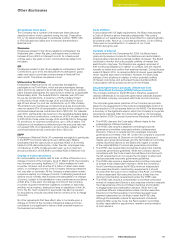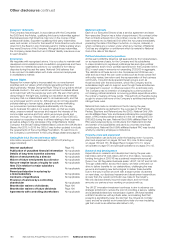National Grid 2016 Annual Report Download - page 186
Download and view the complete annual report
Please find page 186 of the 2016 National Grid annual report below. You can navigate through the pages in the report by either clicking on the pages listed below, or by using the keyword search tool below to find specific information within the annual report.
Infrastructure and IT systems
We may suffer a major network failure or interruption, or may not be
able to carry out critical operations due to the failure of infrastructure,
data or technology or a lack of supply.
Operational performance could be materially adversely affected by
a failure to maintain the health of our assets or networks, inadequate
forecasting of demand, inadequate record keeping or control of
data or failure of information systems and supporting technology.
This in turn could cause us to fail to meet agreed standards of
service, incentive and reliability targets, or be in breach of a licence,
approval, regulatory requirement or contractual obligation. Even
incidents that do not amount to a breach could result in adverse
regulatory and financial consequences, as well as harming our
reputation.
Where demand for electricity or gas exceeds supply and our
balancing mechanisms are not able to mitigate this fully, a lack
of supply to consumers may damage our reputation.
In addition to these risks, we may be affected by other potential
events that are largely outside our control, such as the impact
of weather (including as a result of climate change and major
storms), unlawful or unintentional acts of third parties, insufficient
or unreliable supply or force majeure.
Weather conditions can affect financial performance and severe
weather that causes outages or damages infrastructure together
with our actual or perceived response could materially adversely
affect operational and potentially business performance and our
reputation.
Malicious attack, sabotage or other intentional acts, including
breaches of our cyber security, may also damage our assets
(which include critical national infrastructure) or otherwise
significantly affect corporate activities and, as a consequence,
have a material adverse impact on our reputation, business,
results of operations and financial condition.
Unauthorised access to, or deliberate breaches of, our IT systems
may also lead to manipulation of our proprietary business data or
customer information.
Unauthorised access to private customer information may make
us liable for a violation of data privacy regulations. Even where we
establish business continuity controls and security against threats
against our systems, these may not be sufficient.
Law and regulation
Changes in law or regulation or decisions by governmental bodies
or regulators could materially adversely affect us.
Most of our businesses are utilities or networks subject to
regulation by governments and other authorities. Changes in law
or regulation or regulatory policy and precedent, including decisions
of governmental bodies or regulators, in the countries or states
in which we operate could materially adversely affect us.
If we fail to engage in the energy policy debate, we may not be able
to influence future energy policy and deliver our strategy.
Decisions or rulings concerning, for example:
(i) whether licences, approvals or agreements to operate or
supply are granted, amended or renewed, whether consents
for construction projects are granted in a timely manner or
whether there has been any breach of the terms of a licence,
approval or regulatory requirement; and
(ii) timely recovery of incurred expenditure or obligations, the ability
to pass through commodity costs, a decoupling of energy usage
and revenue, and other decisions relating to the impact of general
economic conditions on us, our markets and customers,
implications of climate change and of advancing energy
technologies, whether aspects of our activities are contestable,
the level of permitted revenues and dividend distributions
for our businesses and in relation to proposed business
development activities,
could have a material adverse impact on our results of operations,
cash flows, the financial condition of our businesses and the ability
to develop those businesses in the future.
Following the introduction of EMR, there has been an increased
focus (from some of our stakeholders) on the potential conflicting
duties of our transmission and system operator roles, which may
damage our reputation.
The remediation plans in place or being implemented to address
control weaknesses in our US business may not operate as
expected, as a result of which we may be unable to provide timely
regulatory reporting, which may include the provision of financial
statements. This could result in the imposition of regulatory fines,
penalties and other sanctions, which could impact our operations,
our reputation and our relationship with our regulators and other
stakeholders.
For further information see pages 176 to 182, which explain our
regulatory environment in detail.
Business performance
Current and future business performance may not meet our
expectations or those of our regulators and shareholders.
Earnings maintenance and growth from our regulated gas and
electricity businesses will be affected by our ability to meet or
exceed efficiency targets and service quality standards set by,
or agreed with, our regulators.
If we do not meet these targets and standards, or if we do not
implement the transformation projects we are carrying out as
envisaged, including to our US enterprise resource planning
systems and controls over financial reporting, or are not able to
deliver our RIIO operating model and the US rate plans strategy
successfully, we may not achieve the expected benefits, our
business may be materially adversely affected and our performance,
results of operations and reputation may be materially harmed and
we may be in breach of regulatory or contractual obligations.
184 National Grid Annual Report and Accounts 2015/16 Additional Information
Internal control and risk factors continued


